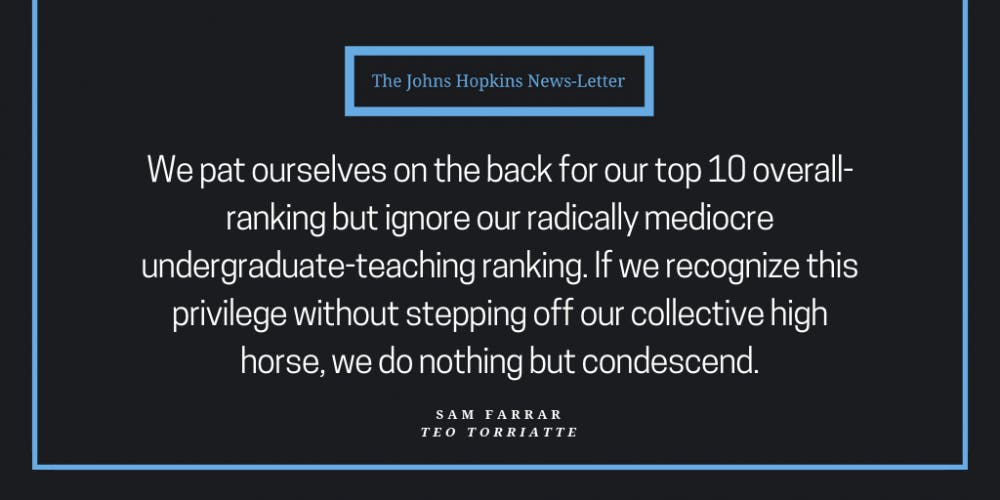
Why did I come here?
This is a question I have been asking myself a lot recently. In a school that produces primarily STEM and Public Health majors, and especially those focused on boosting their track records for medical school, my Political Science major and pre-law aspirations have often felt a little out of place. Even in the world of the humanities, I’m vastly outnumbered by students in programs like the Writing Seminars and International Studies.
Of course, I’m not suggesting that these academic areas serve as the only differentiating factor amongst the student body; there’s no doubt that the popularity of these programs have a large impact on the opportunities and culture on campus.
Despite knowing that my aspirations didn’t fit with the professions that Hopkins is known for, I knew I wanted to come here from the moment I visited over the spring break of my junior year of high school. Without a doubt, one of the biggest draws for me was the opportunity to work on undergraduate research.
I vividly remember my tour guide (who I explicitly chose for his familiar cowboy hat and southern accent) taking my group through the bottom of the Undergraduate Teaching Labs (UTL) as he recited facts about the three-quarters of undergraduates who participated in research, a statistic I’d already seen plastered on every piece of admissions marketing.
While, as a sophomore, I have yet to take advantage of this opportunity, it is something that undoubtedly has an impact on all of our educational experiences here, for the better or worse.
I am in the minority. Most of my friends have held a position under a professor at some point, at least. Their experiences... vary. On the one hand, there are those who are deeply passionate about their research. Watching their eyes light up as they discuss the minutiae of their project designs is enthralling, and conversations on the subject often end with a strong encouragement that I should get involved myself.
On the other hand, an equal amount, if not more, regard their research as nothing more than a sacrifice for their resume or an alternative to getting a student job. Some have actively tried to get themselves fired to get out of continuing without explicitly leaving, while others have resigned themselves to an apathetic attitude toward their work. While no one has directly discouraged me from pursuing research opportunities, their constant comparisons of it to slave labor aren’t very inspiring.
However, in the end, even my 17-year-old daydreams didn’t envision conducting Nobel-prize winning research as an underclassman. What I’ve found to be the greatest distinguishing factor in attending a research-focused university was the effects it has on the classroom.
Compared to the experiences of my college-attending friends from high school, the relationship between faculty and students is significantly colder. Of course, I never expected to be having dinner parties with the professors of my 200 person freshman lectures, but it has only really been this year that a professor has been able to recognize me without referencing a roll-sheet.
The fact that I’ve only just begun to develop meaningful relationships with faculty may very well be in large part my fault. I’ve never hesitated to raise my hand in class, but I’ve also never made numerous trips to office hours or organized out-class-meetings and so on. However, looking back, this seems to be more of a symptom of a problem than a cause of it.
I hear of professors practically begging students to come to office hours from friends back in North Carolina, while here, most, in my experience at Hopkins, have seldom brought it up beyond their rambling on syllabus day. When faculty are one of the first out the door after 50 minutes, there’s not a lot of incentive to build a relationship with them.
By no means do I mean this as a condemnation of Hopkins professors. It’s not due to any ambivalence toward their instruction, responsibilities or lack of competence in their teaching abilities.
In fact, for many of the faculty, the lack of deeper relationships with their students is just as much as a compromise for the privilege of attending a university where they can put so much of their emphasis on research as it is to many of us. It’s not an inherently good or bad thing, but a simple trade-off we have collectively decided to make.
Whether you perceive the research opportunities as a privilege or a responsibility, it does not come without a cost.
While it is good to recognize the unique privileges that we have at Hopkins, it can also feel a bit masturbatory. We pat ourselves on the back for our top 10 overall-ranking but ignore our radically mediocre undergraduate-teaching ranking. If we recognize this privilege without stepping off our collective high horse, we do nothing but condescend.

















